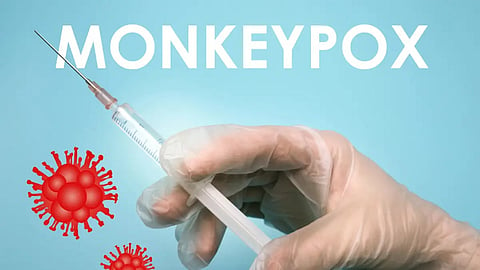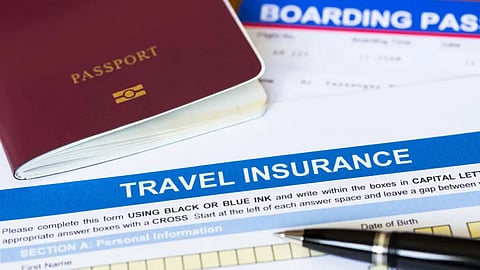Just when people were finally getting ready to travel outside India after two years of pandemic-induced lockdowns, another viral outbreak seems to have reared its ugly head – this time it’s monkeypox.
Right Insurance Can Keep Monkeypox From Monkeying Around With Your Travel Plans Abroad
If you plan to visit abroad in the coming months, you will need a good travel and health insurance policy to keep the monkeypox virus from monkeying around with your travel plans
So far, over about 257 suspected and 120 confirmed cases have been recorded across 23 countries globally, and while the World Health Organization (WHO) has said that the monkeypox outbreak “will not turn into a pandemic”, but if you intend to travel outside India, here are things to keep in mind and buy a comprehensive travel and health insurance policy.
What Is Monkeypox?
Monkeypox is a rare, usually mild infection, typically caught from infected wild animals in parts of Africa. It was first discovered in 1958, when two outbreaks of a pox-like disease occurred in colonies of monkeys kept for research, hence the name ‘monkeypox.’
How Will Existing Health And Travel Insurance Cover Monkeypox?
- Monkeypox being a viral infectious disease, most existing health and travel policies will cover the expenses incurred.
- In India, monkeypox will be covered under most travel and health insurance, provided it supports outpatient department treatment (OPD) expenses.
- As such, there is no need for an additional special insurance policy only for monkeypox.
Says Kapil Mehta, co-Founder, SecureNow Insurance: “Monkeypox virus is not an exclusion in any health or travel insurance. Typically, monkeypox is treated under OPD. Since most travel insurances cover OPD, these costs will be paid for. If your respective health insurance covers OPD treatment, then this will be covered. If you are hospitalised, then both the travel and health insurance policies will cover this.”
What If You Are Outside India And Contracted Monkeypox?

- If you are outside India and contract monkeypox, your travel insurance will cover it subject to the terms of the policy.
- Your health insurance will not cover it.
Says Rakesh Jain, CEO, Reliance General Insurance: “First, we need to understand that all infectious diseases, including monkeypox, are covered under a basic health insurance policy. If a person is diagnosed and hospitalised in India upon/after arrival, then it will be covered under an individual health insurance policy, and not under a travel insurance policy. A travel insurance policy ceases to be valid once the travel is completed.”
What Expenses Will Travel Insurance Bear?
There are two scenarios to this.
1] If you contract monkeypox and recover without hospitalisation, i.e., in hotel or in isolation centres:
- Any cost incurred (medicine, OPD doctor fees, others) will be covered by travel insurance (if treated abroad) or health insurance policy (if treatment is in India).
- But if you had monkeypox and recovered without any medical treatment or you were in designated isolated centres as a precautionary measure without any active medical treatment, then those isolation fees/expenses will also be not paid.
“Travel policy will cover hospitalisation expenses as per the policy term. Along with OPD treatment cost, consultations, diagnostic expenses, and medical expenses would be payable as per the policy terms. But if only isolation expenses are incurred without active treatment, then those will not be covered either in health or travel policies at any designated centres as well,” says Raghavendra Rao, chief distribution officer, Future Generali India Insurance.
“The key aspect here is if there is an active line of treatment during the isolation. If a treatment requires isolation and monitoring, e.g., as is common during covid, then the costs will be paid for. However, if the isolation is not for treatment, but a protocol to protect others, then the insurance claim may not be paid,” adds Mehta.
2] When your condition is serious, and you have to be airlifted/medically evacuated or hospitalised in a foreign country, the following conditions arise:
- Emergency medical evacuation will be payable under travel policy subject to policy terms and conditions depending on the need for evacuation to India for medical purposes.
- If you do not need any medevac, your health insurance will not pay for any treatment undergone abroad, but travel insurance may, subject to its terms.
- The travel insurance policy will not pay for medevac if you contracted monkeypox and yourself returned to India without requiring medical evacuation.
- So, in essence, if you come back to India and then get treated here for monkeypox, your travel insurance will not cover the costs, but your health insurance policy may pay for it depending on the policy terms.
- But do note that all travel insurance policies will not pay for emergency medical evacuation; so, read the terms and conditions carefully while buying one.
“If it is a medical emergency evacuation, then it will be paid (by the respective travel insurance policy). But say it is planned that you have to return to India during the said time, then it will not be covered,” says Yogesh Agarwal, founder, Onsurity, a technology led monthly subscription-based employee health benefits platform.
Adds Mehta: “There will also be specific requirements for why evacuation was necessary in the first place and treatment was not given in the country where you fell ill. For example, evacuation costs are more relevant when you fall ill in an area where medical infrastructure is poor, and evacuation is necessary to get life-saving treatment fast.”
Other Key Things To Keep In Mind

1. When buying a travel insurance policy, check for the policy’s specific coverage because not all of them cover medical expenses.
“With regard to international travel insurance, it is important to note that certain travel policies only cover accidental death and accidental hospitalisation, but not medical hospitalisation. If a customer opts for the medical expense feature in his/her travel policy, only then all the emergency medical costs, such as hospitalisation costs, outpatient and cashless hospitalisation will be covered during a foreign trip,” adds Jain.
2. Besides, there is also a time lag between buying an insurance policy and when it becomes effective.
“Monkeypox is a virus infection. So all the regular health insurance covers the hospitalisation due to infectious diseases, subjected it is not within 30 days of inception, as that is a waiting period for a new policy,” adds Agarwal.